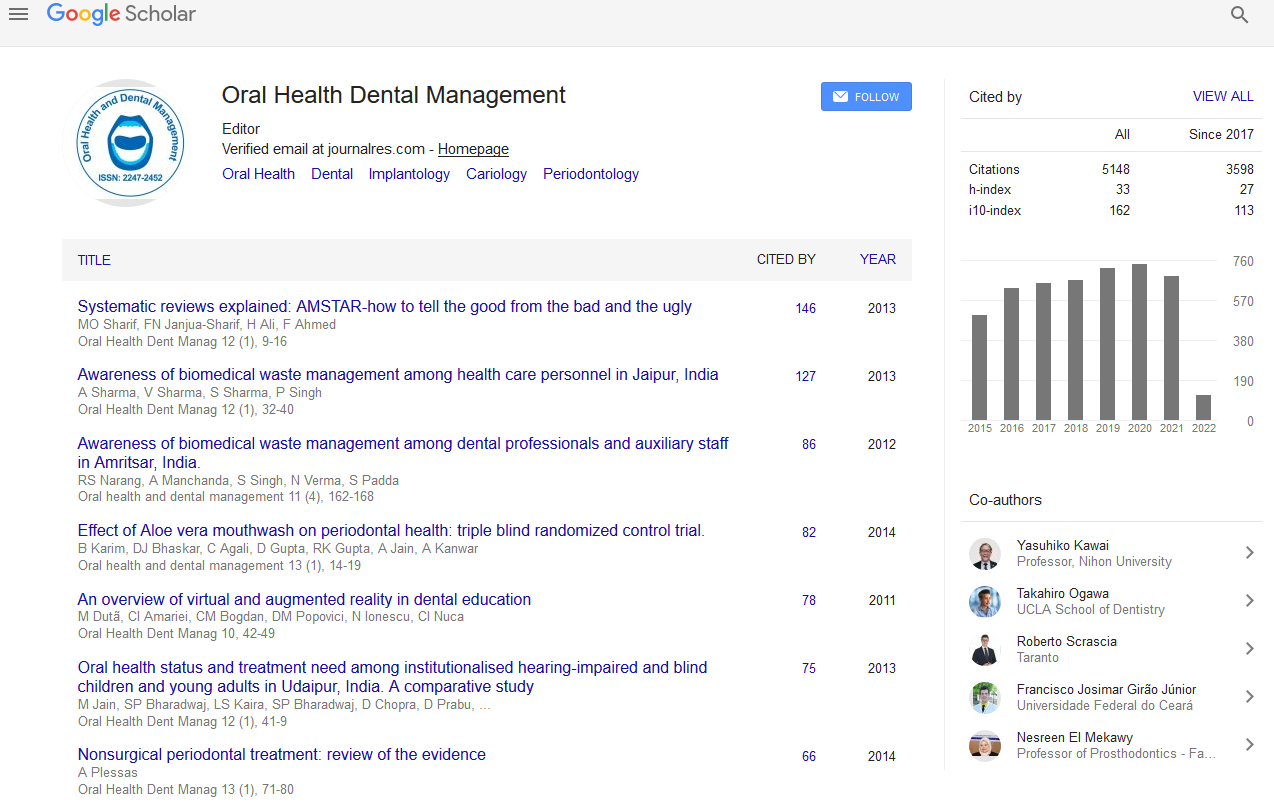Indexed In
- The Global Impact Factor (GIF)
- CiteFactor
- Electronic Journals Library
- RefSeek
- Hamdard University
- EBSCO A-Z
- Virtual Library of Biology (vifabio)
- International committee of medical journals editors (ICMJE)
- Google Scholar
Useful Links
Share This Page
Journal Flyer

Open Access Journals
- Agri and Aquaculture
- Biochemistry
- Bioinformatics & Systems Biology
- Business & Management
- Chemistry
- Clinical Sciences
- Engineering
- Food & Nutrition
- General Science
- Genetics & Molecular Biology
- Immunology & Microbiology
- Medical Sciences
- Neuroscience & Psychology
- Nursing & Health Care
- Pharmaceutical Sciences
Adhesion of periodontal pathogens to self-ligating orthodontic brackets: An in vivo prospective study
11th Asia Pacific Congress on Dental and Oral Health
July 25-27, 2016 Bangkok, Thailand
Kyungsun Kim, Woo-Sun Jung, Soha Cho and Sug-Joon Ahn
Seoul National University, Korea
Posters & Accepted Abstracts: Oral Health Dent Manag
Abstract:
Aim: To analyze adhesion of periodontopathogens to self-ligating brackets (Clarity-SL [CSL], Clippy-C [CC] and Damon Q [DQ]) and identify the relationships between bacterial adhesion and oral hygiene indices. Methods: Central incisor brackets from the maxilla and mandible were collected from 60 patients at debonding after plaque and gingival indices were measured. Adhesions of Aggregatibacter actinomycetemcomitans (Aa), Porphyromonas gingivalis (Pg), Prevotella intermedia (Pi), Fusobacterium nucleatum (Fn), and Tannerella forsythia (Tf) were quantitatively determined using realtime polymerase chain reactions. Factorial analysis of variance was used to analyze bacterial adhesion in relation to bracket type and jaw position. Correlation coefficients were calculated to determine the relationships between bacterial adhesion and oral hygiene indices. Results: Total bacteria showed greater adhesion to CSL than to DQ, while Aa, Pg and Pi adhered more to DQ than to CSL. CC showed an intermediate adhesion pattern between CSL and DQ, but it did not differ significantly from either bracket type. Adhesion of Fn and Tf did not differ significantly among the three brackets. Most bacteria were detected in greater quantities in the mandibular than in the maxillary brackets. Plaque and gingival indices were not strongly correlated with bacterial adhesion to brackets. Conclusion: Considering that Aa, Pg and Pi adhered more to DQ in the mandibular area, orthodontic patients with periodontal problems should be carefully monitored in the mandibular incisors where the distance between the brackets and gingiva is small, especially when DQ is used.
Biography :
Kyungsun Kim has completed her Master’s Degree from Yonsei University, Korea. She is currently in a Doctoral course at Seoul National University, Korea. She has majored in Microbiology and at presently studying Oral Microbiology at Department of Oral Microbiology and Immunology. She has published more than 4 papers in reputed journals and attended many conferences at home and abroad.
Email: kyungsunkim726@gmail.com

